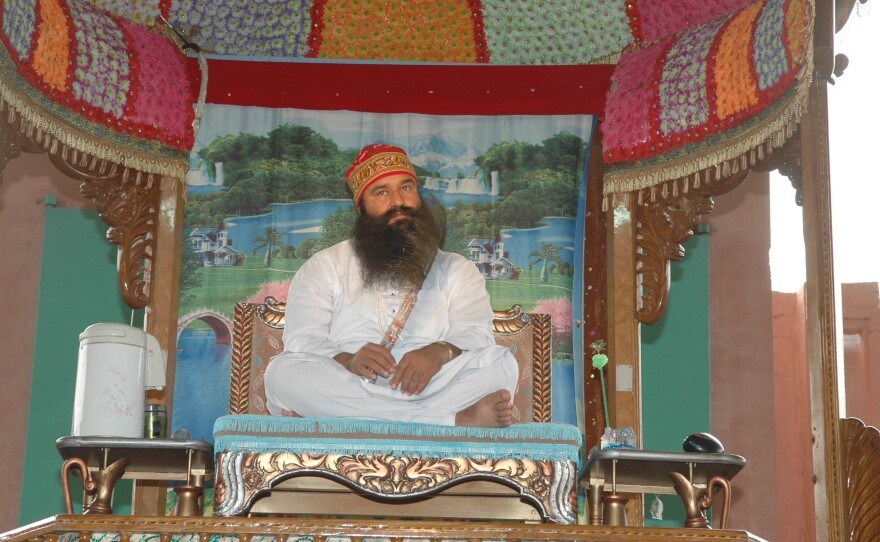Gurmeet Ram Rahim Singh wept and begged forgiveness as a judge read out the sentence against him on Monday: 20 years for raping two young disciples in 2002 at his compound in the northern Indian state of Haryana. The self-proclaimed Sikh guru received 10 years for each offense, to be served consecutively.
The burly, bearded 50-year-old wailed that he was innocent and had to be carried out by marshals, according to reporters at the prison hearing.
The case of Singh, also known as the "Guru of Bling," has exposed the seedy underbelly of one of India's high-profile, self-styled spiritual leaders.
Singh stood out: a flamboyant persona with a penchant for souped-up motorcycles and an ostentatious fashion sense. He scripted and starred in his own movie, the 2014 film MSG (for "Maharaj Saint Gurmeet," one of his monikers) in which he cast himself as a heroic messenger of God – a message former members of his sect, known as Dera Sacha Sauda, say was drilled into them.
On his website, he is extolled as "Spiritual Saint," "Musician," "Director," "Superb Medic," "Sportsman," "Feminist," "Emperor of Melodies" and "Social Reformer" — among other things.
But on Monday, he was just a prisoner. A library inside the jail in Rohtak, a town 50 miles north of New Delhi where Singh had been held since his conviction, was hastily converted into a courtroom. So concerned were authorities over a repeat of the violence unleashed after his conviction that Judge Jagdeep Singh was helicoptered in to read out his judgment.
Security was the order of the day throughout the entire state. Thousands of troops were deployed in Haryana to keep the peace that was shattered on Friday.
On Monday, a small convoy of army vehicles moved through Panchkula's streets in a show of force meant to discourage Singh's supporters from staging more violence. After his conviction on Friday, they vandalized train stations, burned cars and motorbikes and damaged government buildings. More than 30 people died in the violence.
"We're here because the police couldn't control the situation," said an army officer who asked not to be identified.
Many of those who had run amok came from elsewhere. Panchkula's deputy commissioner of police, Manbir Singh, told NPR that some 900 people had been detained and were being held in jails in other cities.
The High Court in Chandigarh, the state capital, savaged the state's security officials for the large loss of life and damage to property. The court ordered the government to provide a list of Dera Sacha Sauda property holdings with an eye toward seizing them.
Singh's compound was also ringed by the army on Monday. Some devotees voluntarily evacuated while others continued to defy a request that they vacate the premises.
Many of Singh's followers are Sikh Dalits, who sit at the bottom of the social hierarchy. They turned to his sect for basics like food, medicine and a sense of equality, and their guru's conviction was an unimaginable fall from grace.
His defense counsel made a plea for leniency, portraying Rahim as social worker, citing his philanthropic work on behalf of destitute women and recovering alcoholics.
One of the rules of the Dera Sacha Sauda is to reject any criticism of Singh. Supporters were quick to call the allegations against him baseless, trumped up by those who feared the guru's popularity.
Although he boasts of having millions of followers, there is no authoritative number. Politicians believed he could deliver his followers to the polls, and both India's Congress Party and ruling BJP had aligned with Singh. Critics says his political connections lent to his aura and heightened his sense of impunity.
Singh recently backed Narendra Modi's BJP and enjoyed the largesse of the BJP Haryana state education minister — who presented Singh with a sizable donation just days before his rape conviction, and insisted his rampaging followers were "peaceful."
The donation coincided with the guru's birthday — marked by a cake that his website claims held 150,000 birthday candles and breaks the world record for most candles.
Singh is now imprisoned on a non-bailable offense. His lawyers say they will appeal the sentence and the rape convictions.
But his legal drama will not end there. Next, he'll face charges of murder in connection with the death of a reporter, Ram Chander Chhatrapati. The journalist was killed in 2002 — after exposing the cases of rape for which Singh was convicted last week.
Copyright 2017 NPR. To see more, visit http://www.npr.org/.






